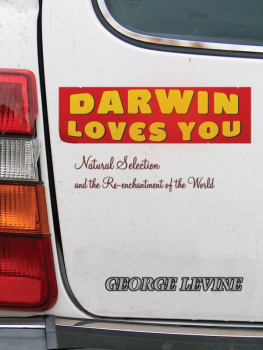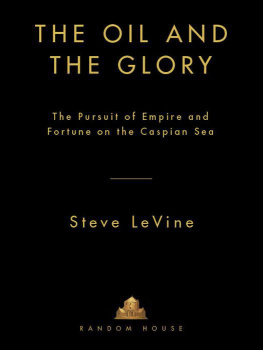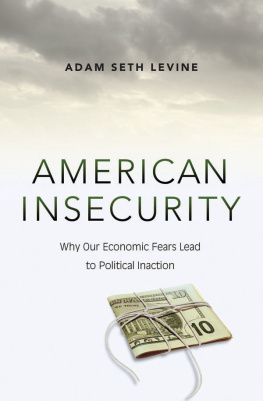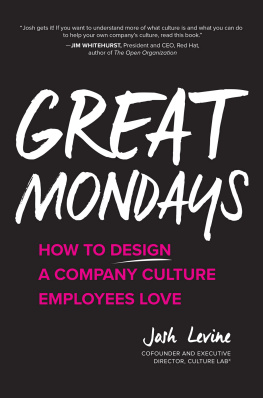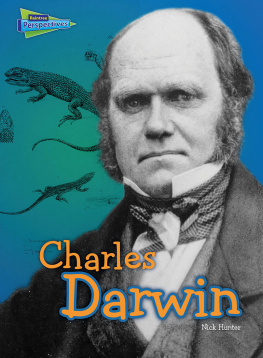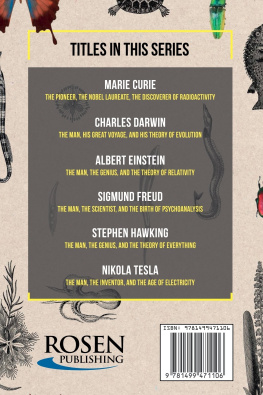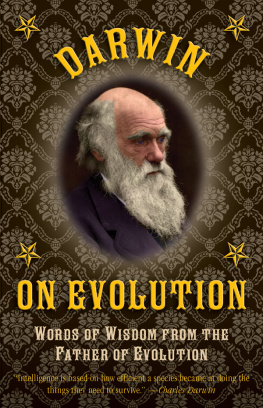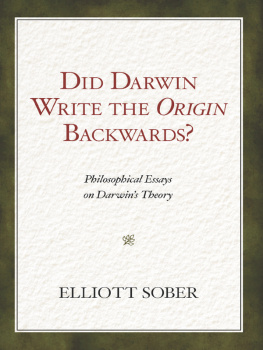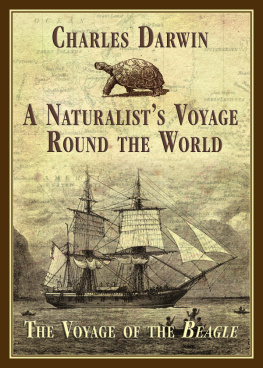Levine - Darwin Loves You: Natural Selection and the Re-enchantment of the World
Here you can read online Levine - Darwin Loves You: Natural Selection and the Re-enchantment of the World full text of the book (entire story) in english for free. Download pdf and epub, get meaning, cover and reviews about this ebook. City: Princeton;N.J, year: 2008, publisher: Princeton University Press, genre: Science. Description of the work, (preface) as well as reviews are available. Best literature library LitArk.com created for fans of good reading and offers a wide selection of genres:
Romance novel
Science fiction
Adventure
Detective
Science
History
Home and family
Prose
Art
Politics
Computer
Non-fiction
Religion
Business
Children
Humor
Choose a favorite category and find really read worthwhile books. Enjoy immersion in the world of imagination, feel the emotions of the characters or learn something new for yourself, make an fascinating discovery.
Darwin Loves You: Natural Selection and the Re-enchantment of the World: summary, description and annotation
We offer to read an annotation, description, summary or preface (depends on what the author of the book "Darwin Loves You: Natural Selection and the Re-enchantment of the World" wrote himself). If you haven't found the necessary information about the book — write in the comments, we will try to find it.
Darwin Loves You: Natural Selection and the Re-enchantment of the World — read online for free the complete book (whole text) full work
Below is the text of the book, divided by pages. System saving the place of the last page read, allows you to conveniently read the book "Darwin Loves You: Natural Selection and the Re-enchantment of the World" online for free, without having to search again every time where you left off. Put a bookmark, and you can go to the page where you finished reading at any time.
Font size:
Interval:
Bookmark:


Natural Selection and
the Re-enchantment of the World
George Levine
PRINCETON UNIVERSITY PRESS
PRINCETON AND OXFORD
Copyright 2006 by Princeton University Press
Published by Princeton University Press, 41 William Street, Princeton, New Jersey 08540
In the United Kingdom: Princeton University Press, 6 Oxford Street, Woodstock,
Oxfordshire OX20 1TW
Requests for permission to reproduce material from this work should be sent to
Permissions, Princeton University Press.
Third printing, and first paperback printing, 2008 Paperback eISBN: 978-1-40082-733-6
All Rights Reserved
The Library of Congress has cataloged the cloth edition of this book as follows
Levine, George Lewis.
Darwin loves you : natural selection and the re-enchantment of the world / George Levine.
p.cm.
Includes bibliographical references and index.
1. Darwin, Charles, 18091882Influence. 2. Natural selection. 3. Civilization, Secular. 4. Social Darwinism. I. Title.
QH31.D2L48 2006
576.8'2092dc222006005401
British Library Cataloging-in-Publication Data is available
This book has been composed in Univers and Palatino
Printed on acid-free paper.
press.princeton.edu
Printed in the United States of America
3 5 7 9 10 8 6 4
Few people seem to perceive fully as yet that the most far-reachingconsequence of the establishment of the common origin of all species isethical; that it logically involved a re-adjustment of altruistic moralsby enlarging as a necessity of rightness the application of what hasbeen called The Golden Rule beyond the area of mere mankind tothat of the whole animal kingdom.
Thomas Hardy, The Life and Work of Thomas Hardy
TO MIA, AARON, BEN,
Who prove that the world is enchanted after all
CONTENTS
PREFACE
Some months ago, my son, knowing a great deal about the full range of my beliefs, sharing most of them, and aware that I was still fascinated by Darwin, gave me a bumper sticker that read, Darwin Loves You. My son is given to an irony and comic cynicism that I have always admired and partly feared, and I was a little uneasy about the obvious aggression that would be entailed in putting the sticker on my car. But there were reasons other than the aggressive and massive public push to religiosity that has so marked the early years of the twenty-first century in America that led me to paste the sticker on after all. I had come to realize that in a perhaps comic, at least ironic way, the bumper sticker was implying something true and important about Darwin that had attracted me to him in the first place and that had continued to attract me after twenty years of study.
It was that realization that led me to shift away from my original intentions in writing this book and to develop them in different directions. I had wanted to consider the strange cultural history of Darwins scientific theory, the fact that it has been used as support for the most extraordinary variety of cultural, political, and ideological projects. Many who have taken opposed ideological and moral positions have considered themselves true Darwinians. Part of my point was (and remains central to the book as I finally have written it) to defend Darwin from some of the popular conceptions of Darwinism, in particular, from the view that his theory intrinsically entails both a radical denial of moral and aesthetic value (because it attempts to explain these phenomena naturalistically) and a simple sanctioning of the worst aspects of dog-eat-dog capitalism.
My overall point was to develop further the argument I have made elsewhere, that scientific and philosophical theories have no intrinsic connection with particular political or social positions. Conceding from the start that any philosophical or scientific idea is certain to be marked by the time and place of its conception, the social and political context of its development, I wanted to show how Darwins ideas were later adapted to many markedly different cultural and political positions. I was convinced by the history of Darwinism that when the idea is adopted by other thinkers in other contexts, it is likely to be usable in very different ways, responsive to the newer contexts rather than to Darwins own. This contingency of ideas means that old ideas in new contexts will take on ideologically different implications. The political and ideological implications of Darwins ideas (of any philosophical ideas) are not constitutive but contingent. On the one hand, to use my dominant example, a convincing argument has been made for the deep connection between Darwins thinking and laissez-faire economics, in particular via his reading of Malthus (and this view is thought by many of the best Darwinian scholars to be constitutive rather than contingent), and on the other, there is abundant evidence that his theory has been used to support such incompatible positions as anarchism and socialism.
Yes, for Darwin it may well have been a dog-eat-dog world, but for Kropotkin, to take one example, Darwins ideas served as a strong theoretical basis for anarchism and mutual aid. Of course, I dont mean to say, then, that Darwins theory is rightly interpreted as anarchist in orientation, but there can be no doubt that it can be used by smart anarchists, and was so used. The political connections of Darwins own experience were clearly important to the development of the theory but were not permanently built in to the theory itself as it was to float freely through the culture and into future generations. We may find it useful to understand Darwin, as several excellent recent biographies have done, by understanding the particularities of his own social, cultural, and political context, but then, to understand and recognize other versions of Darwin, we would have to understand the particularities of the later theorists contexts.
The turn my sons bumper sticker provoked in my project follows naturally enough from the consideration of the uses of Darwin that I had originally intended, and in building the argument of this book toward what now seems to me the bumper stickers most interesting implications, I have felt obliged to demonstrate (as I try to do, in particular, in the second chapter) how flexible, indeed, Darwins theory is in cultural interpretation. But the history of interpretations of Darwin is not the history of a series of intellectuals who simply misinterpret him for their own purposes. Rather, virtually all of them legitimately located in his writings arguments that might sanction their own positions (almost, one might add, the way the Bible continues to be mined for ideological possibilities, except that Darwinians seem to be much more careful to think through the whole context of Darwinian thought as they take his theories where they want to go). That is to say, for example, that Kropotkin had strong grounds in finding important evidence that mutual aid rather than nature red in tooth and claw is the dominant significance of Darwins theory of the struggle for existence. Virtually all the interpretations that have been developed are at least partly justified by what Darwin actually wrote.
But working on Darwin in these contentious days, I found it peculiarly difficult to sustain the scholarly detachment that would have been required simply to record with a kind of Weberian disinterest the various more or less legitimate interpretations of Darwin that history has thrown up. Since I do in fact believe that all knowledge is historically contingent but, at the same time, that knowledge is disseminated in ways that will inevitably free it from its initial contingencies (even if only to lock it into later ones), I was not disturbed by the fact that I was finding in Darwin yet another set of cultural implications. My major responsibility, I believed, was to honor what Darwin actually wrote. It is part of the overall argument of this book that any interpretation of Darwin has such a responsibility to Darwins own words, and to the evidence one can find in his life and work. The fact of contingency does not argue one way or the other for the validity of the theory or the knowledge. There is no way to escape contingency, and while the tendency of criticism has been to assume that once contingency is discovered the validity of the theory is called into question, I want to argue that contingency is the condition for any knowledge and may in fact contribute importantly to the possibility of developing that knowledge at all. Darwins extraordinarily creative and useful theory developed out of the rigors of his scientific work
Next pageFont size:
Interval:
Bookmark:
Similar books «Darwin Loves You: Natural Selection and the Re-enchantment of the World»
Look at similar books to Darwin Loves You: Natural Selection and the Re-enchantment of the World. We have selected literature similar in name and meaning in the hope of providing readers with more options to find new, interesting, not yet read works.
Discussion, reviews of the book Darwin Loves You: Natural Selection and the Re-enchantment of the World and just readers' own opinions. Leave your comments, write what you think about the work, its meaning or the main characters. Specify what exactly you liked and what you didn't like, and why you think so.

